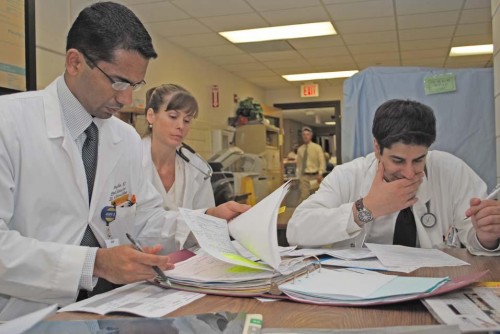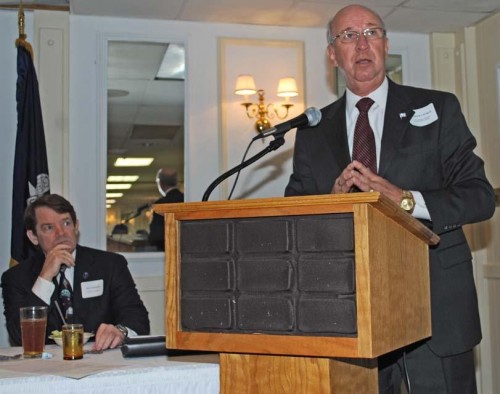
First-year docs learning on the front line at Chabert
April 22, 2009Beulah Bergeron
April 24, 2009The state’s education superintendent defended his policies and told local business leaders that the public school system needed dramatic changes to prepare students for future job opportunities.
Paul Pastorek made the comments at last Tuesday’s Houma-Terrebonne Chamber of Commerce general membership meeting.
Pastorek said he wanted to reinvent education as we know it.
“The world has changed, and if public education does not change with it then we will continue to be a place where it is very hard to attract economic development,” he said. “We want an education system so good in this community that businesses look to relocate to this community.”
Pastorek claimed the current system produces too many high school graduates that are still not ready for college and careers. He noted that 50 years ago, most high school graduates could get a job that paid a living wage in the state. However, today 70 percent of high school graduates need secondary education to earn a living wage in Louisiana.
“The way we educate in Louisiana is tied to longstanding tradition and culture, but it is not able in a large scale way to prepare our students for the future,” he said. “I want to make (public) education so good that you don’t have to send your kids to a private or parochial school.”
Travis Lavigne, chancellor of L.E. Fletcher Technical Community College, which sponsored the meeting, said Pastorek’s message was on target and supported by data. He knows first- hand the challenges of students who enter postsecondary education unprepared.
“We see a small of number of students who have difficulty adjusting to higher education,” he explained. “We pull them to the side and give them extra assistance so they can catch up and be successful.”

Pastorek defended his recent proposed changes for local school boards, which the Board of Elementary and Secondary Education (BESE) decided to let the state Legislature address.
Some of his ideas included term limits for school board members, pay reduction, requiring a two-thirds majority to fire superintendents and removing the board’s ability to approve personnel decisions.
Terrebonne Parish School Board members have claimed Pastorek’s proposals were an attempt to take control of local boards. Pastorek said that is not the case.
“There is nothing in the changes I proposed that would give Baton Rouge any more jurisdiction over the school boards,” he insisted.
One school board member accused Pastorek of wanting to abandon public education in favor of charter schools.
Despite mentioning the turnaround of the New Orleans Recovery School District in part because of competition between traditional public and new charter schools in his presentation, Pastorek denied the charge saying he only wants what is best for students’ education.
“I have no preference for charter schools over the public schools,” he said.
Pastorek insisted that local school boards focus their attention on two interwoven issues: truancy and graduation rates.
He said connecting students to skills during high school is key to keeping students interested in education. He called for the expansion of the Jobs for America’s Graduates (JAG) program in the parish.
He said that 95 percent of the students in the program graduate from high school. Similarly, he called for school districts to set a graduation rate goal of 95 percent. Terrebonne’s graduation rate is at the state average of 65 percent.
“If you’re average for Louisiana, and Louisiana is 50th in just about every education standard there is, that’s not much to be proud of,” Pastorek said.
Local BESE representative Glenny Lee Buquet said she hopes chamber businesses accept Pastorek’s challenge in addressing graduation rates.
“I would like to see chamber business give shadowing jobs and internships to those students who are in programs for career and technical education,” she said. “We need those business partners to open their doors to give our students a chance to participate.”
Pastorek noted that despite spending billions of dollars, only 24 percent of schools reached the state’s 10-year accountability goal of a 100 or better School Performance Score (SPS) last year. Also, more than 50 percent of Louisiana schools are below the state average of 86.3 SPS.
What gives him hope for a brighter future are the small, incremental achievements the state has produced.
According to the 2009 Education Watch State Report, Louisiana was the only state where the gap between African-American and white students narrowed significantly in both 4th-grade reading and 8th-grade math.
The gap between African-American and white students in 4th-grade reading was reduced by 12 points from 1998-2007; and the gap between African-American and white students in 8th-grade math shrunk by 11 points from 2000-07.
“We’re proud we have closed the gaps between race and class in Louisiana. We’re proud we have an accountability system that has served us well, but we have many, many more miles to go, and frankly, we’re not going to do it with incremental change.”
L.E. Fletcher Chancellor Travis Lavigne addresses the Houma-Terrebonne Chamber general membership as guest speaker state Education Superintendent Paul Pastorek looks on. Lavigne praised Pastorek’s support of high school programs that help students attain needed skills for the workforce. * Photo by KEYON K. JEFF










